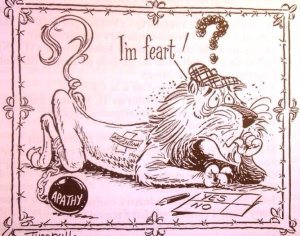Prior to the referendum Peter Wilby, writing in The New Statesman, said that a happy outcome of the referendum campaign was the humiliation of David Cameron.
True, it did look at one point that the leader of the Conservative and Unionist Party would preside over the break up of the union but when it comes to humiliation you need look no further than than Ed Milliband.
He and the shadow cabinet were invisible throughout the campaign in what is, if a head count of Labour MP’s is anything to go by, a Labour stronghold. Only at the very last minute did the labour front bench arrive in Glasgow, where they were met by a man on a rickshsaw playing Darth Vadar’s theme from Star Wars and chanting “here are your masters.” This foray north also saw Ed Milliband walking away from a woman who was asking why Labour support payments for the retention of the trident nuclear missile system when people like her were struggling to find a decent home.
Gordon Brown, largely on his initiative it would seem, took the Better Together campaign into his own hands and forced the leaders of the 3 main Westminster parties to sign a vow to transfer further powers to Holyrood in event of a no vote. Not travelling together or appearing on the same platform when in Scotland does not excuse Ed Milliband from standing alongside the tories.
Scottish Labour was even more abject in it’s failure to respond effectively to the yes campaign. They have underestimated the Scottish people before, believing that the voting system for the Holyrood parliament would ensure that a mandate for a referendum would never be secured. In 2011, despite the voting system which was supposed to prevent it, the SNP gained a landslide victory which made the referendum inevitable.
Scottish Labour has treated the SNP government, in majority control since 2007, as a blip. It has failed to respond as effectively as the SNP, and more recently the alliance of organisations that make up the yes movement, have stolen the ground on issues of equality, fairness and social justice. This movement , which has prompted a huge increase in membership of the political parties which urged a yes vote, is now the natural home of those seeking an alternative to the austerity agenda imposed by the ConDems and parroted by Ed Balls (and Ed Milliband if he’d remembered that part of his speech) at the Labour Party Conference.
While the welfare state has been rolled back in England and will stay rolled back even if Ed Milliband gets into power in 2015 Alex Salmond and the SNP have moved forward on issues such as free prescriptions, social care for the elderly and scrapping tuition fees.
The Labour Party has become so complacent, so sure that it could rely on habitual labour voters to turn out and vote along party lines, that it had few records of who those voters were, where they lived and whether they would vote no as instructed by the party. Large numbers of grassroots activists, alarmed that the party would stand shoulder to shoulder with the tories and liberals, refused to canvas for no. As a member of the co-operative party, I received a letter “urging Scottish Co-operative Party members to support our sister party, the Scottish Labour Party’s United with Labour campaign”, and I duly resigned from said party. Getting the labour no vote out depended in large part on activists from Wales and the north of England who, as well as being unfamiliar with the territory, were themselves often less than 100% committed to the better together cause.
There are some labour supporters who do, without question, back the union. Until 1965 there was a Unionist Party in Scotland and it was, at that time, the party of the protestant working class. We saw them out in support of the Orange Lodge and at the centre of violent protest in George Square immediately after the referendum result was known.
I can understand why the Labour Party would want to preserve the union as Scotland regularly returns a large number of Labour MPs to Westminster. But why would Scotland support Labour? Why should voters in Scotland continue to support a party whose policies include maintaining Trident, allowed privatisation of the NHS, support the ConLib austerity measures and recommend cuts to public spending and and a party whose MPs vote to wage wars overseas.
There is a mood in Scotland, started in government by the SNP and energised by the alliance of groups who united around the yes campaign, for a fairer, more just society. Elections in 2016 might see parties who support this agenda flourish. In the meantime there is the 2015 UK general election. If Peter Wilby thinks David Cameron has been humiliated – Peter, you aint seen nothing yet.


